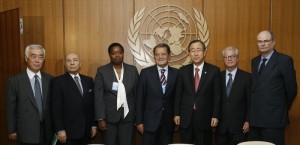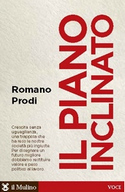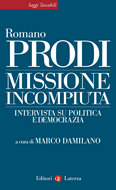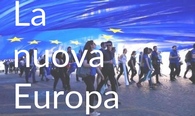Pace e stabilità in Africa sono essenziali per la crescita economica

The UN-AU Panel with Secretary-General; Mr. Roman Prodi (Italy), appointed to chair the Panel of distinguished persons; Mr. James Dobbins (United States); Mr. Jean-Pierre Halbwachs (Mauritius); Ms. Monica Juma (Kenya); Mr. Toshi Niwa (Japan); and Mr. Behrooz Sadry (Iran).
G-8 focuses on continent
Peacekeeping stressed as key to development success
By Romano Prodi on The Washington Times; July 8, 2009
When the Group of Eight industrialized democracies meet each year, the topics usually center on issues involving the respective countries’ interests in the Northern Hemisphere.
However, at the current G-8 summit — Wednesday through Friday in L’Aquila, Italy — Africa will be an important issue for discussion, and major African leaders have been invited to participate.
The problem of peacekeeping will be center stage because, unfortunately, violence still permeates many parts of the African continent. From the Horn to the Great Lakes to West Africa, conflict is endemic. The cost is staggering: Millions of people have been killed, and billions of dollars have been spent.
Associated problems — such as poor infrastructure, environmental threats, displacement and disease — mean the aftermaths of conflicts often are more damaging and long-lasting than the conflicts themselves. As a result, many attempts by the international community to alleviate poverty in Africa fall short.
Though military capability can be part of the solution, peace on the African continent cannot be achieved only by deploying force. Measures such as early warning, conflict prevention and resolution as well as post-conflict reconstruction also should be part of the peacemaking capacity.
The U.N. Security Council is charged with maintaining international peace and security, and — to its credit — U.N. peacekeeping efforts have undergone an exponential increase since the early 1990s.
However, it is becoming increasingly clear that these crucial objectives cannot be achieved without the much deeper involvement of African institutions, such as the African Union (AU) and various regional organizations.
A significant amount of synergy can be generated by drawing on the respective capacities of these local organizations, but the AU has recognized the need to develop its own capacity to respond to crises on the continent.
That is why the six-member U.N./AU panel charged with studying peacekeeping in Africa (which I happen to chair) calls for increasing participation of the AU in the decision-making of peace operations there. In our report, we recommend that a sufficient peacekeeping capacity should be bolstered through financing so responsibility and ownership eventually are transferred to the AU.
However, when I discussed the findings of our report at the U.N. Security Council on March 18, I found there was not a genuine desire from all of the most relevant countries to empower the AU to eventually take care of African peace.
After more than 30 declarations, two extremes developed: On one side, China, Italy, and other Mediterranean countries as well as the African nations themselves responded positively. France, the United Kingdom and Japan expressed considerable doubts.
Sadly, I feel such opposition brings back memories of old colonial behavior, which is very dangerous for the future of Africa and the world as a whole.
We need long-term strategies at the continental, national and local levels that support the efforts of political leaders to develop effective governance and the capacities to produce the stability essential for peace and economic growth.
Without this vision for the future, we will end up defining the problems of African wars as local conflicts, religious confrontation or the expansion of terrorism.
But these aren’t the reasons why Africa is racked with violence. Rather, they are the consequences of a lack of empowerment of the African people themselves to take care of their problems. It is time to help them have it.
Romano Prodi is the chairman of the U.N.-AfricanUnion Panel for Peacekeeping in Africa. He is the former president of the European Commission and the former prime minister of Italy.






















